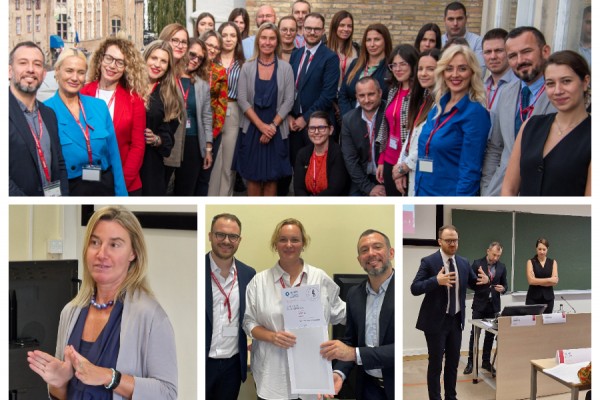
Executive Training on EU Integration delivered in partnership with the College of Europe: A transformative learning initiative
11-12 October 2023, Bruges, Belgium
The Executive Training on EU Integration conceptualised as a transformative learning initiative jointly designed by the College of Europe and the Regional School of Public Administration, was organized in Bruges, Belgium on 11 and 12 October 2023. The comprehensive training program was meticulously designed to contribute to the empowerment of public servants with the knowledge, skills, and insights necessary to navigate the intricate path towards EU membership effectively. Over the course of the program, 23 public servants from the region, through the presentations of renowned lecturers, group discussions, identification of best practices and scenario-building, delved into the particulars of EU external relations, legal framework and decision-making system, communication in an EU-related environment, EU budget, recovery plan, EU digital policies, etc.
Attendees had the chance to discuss with the former EU High Representative for Foreign Affairs and the Rector of the College Ms. Federica Mogherini on the Enlargement momentum and the necessity to strengthen the human capital for an accelerated accession negotiation process.
Here's a glimpse into what participants explored:
EU External Relations: This module featured two sessions. The first session delved into the decision-making system and the overall operation of the European Union. The second session concentrated on the challenges faced by the EU and their impact on the enlargement process. The objective of this module was to furnish participants with a comprehensive understanding of the EU's structure and functioning, including how it interacts with both its member states and the enlargement process, seen in the wider geopolitical context.
EU public finances and Budgetary Policies: This module aimed to provide insights into the EU budget, which serves as the primary source of financing for EU policies and programs. It began with a discussion of the unique features of the EU budget and then proceeded to cover the 2021-2027 Multiannual Financial Framework (MFF) and Recovery Plan. The module also tackled the impact that the enlargement might have on the budget of the Union in various aspects.
EU Communication: In this module, participants explored the opportunities and challenges of communicating within the EU and conveying information about the EU. It adopted a holistic approach to the strategic role of communication in the European Union, analyzing the opportunities and challenges of communicating within and about the EU. The module also examined the communication strategies employed by EU institutions.
EU Digital Transformation: This module centered on European digital policies and offered an overview of the economic and societal challenges facing the EU, as well as the Union's response to these challenges. Given the ongoing digital revolution, this module was designed to equip participants with a deeper understanding of the current challenges and the EU's strategic approach to them.
Renowned lecturers such as David Phinnemore, Anne Vitrey, Carme Colomina and Luis Viegas Cardoso, with extensive experience in EU institutions and EU decision-making processes, added values to the whole concept of the programme, with concrete real-life examples and scenarios and through engaging into discussions with participants.
Participants, after two intensive days, in which they were active and eager to discuss and share with each other as well as with the lecturers, deserved the Executive Certificate.
ReSPA Programme Coordinator, Genti Xhaxhiu, emphasized that the main goal of the programme was to equip the participants with the tools to drive positive change, enhance regional cooperation, and contribute to the overall progress of the Western Balkans on its European integration path – by decrypting the most recent developments in EU as well as related to the Enlargement file. He also informed that this is only the beginning of the cooperation with the College of Europe and that both institutions will seek new cooperation paths in the upcoming period.



